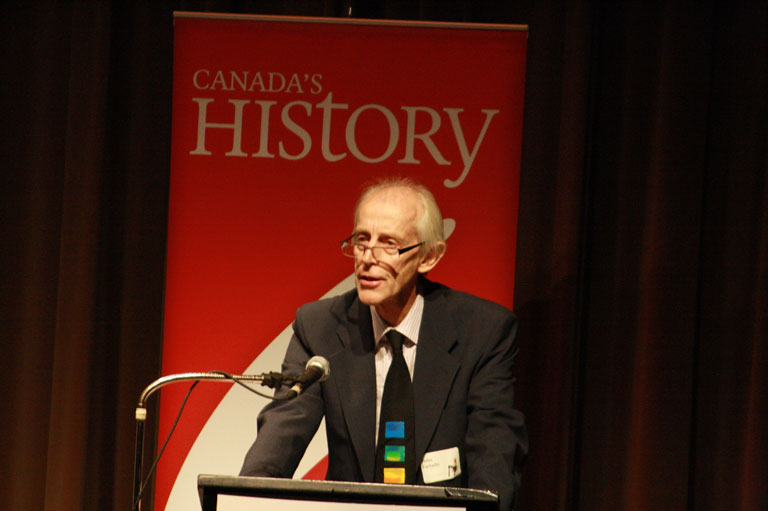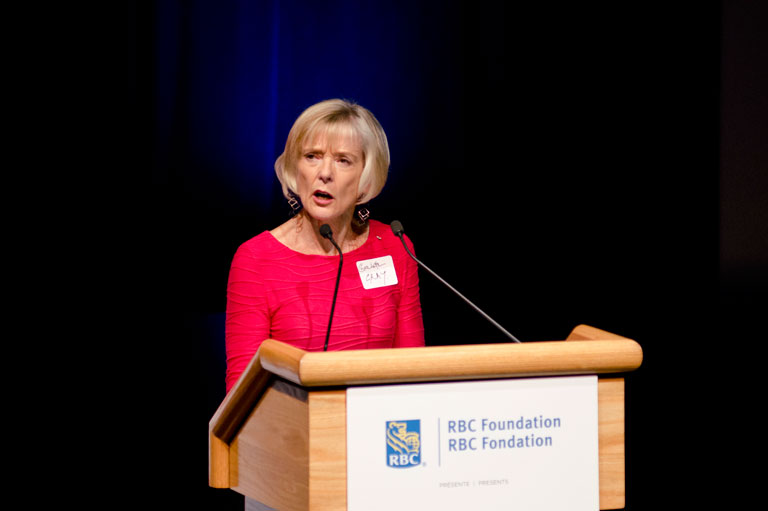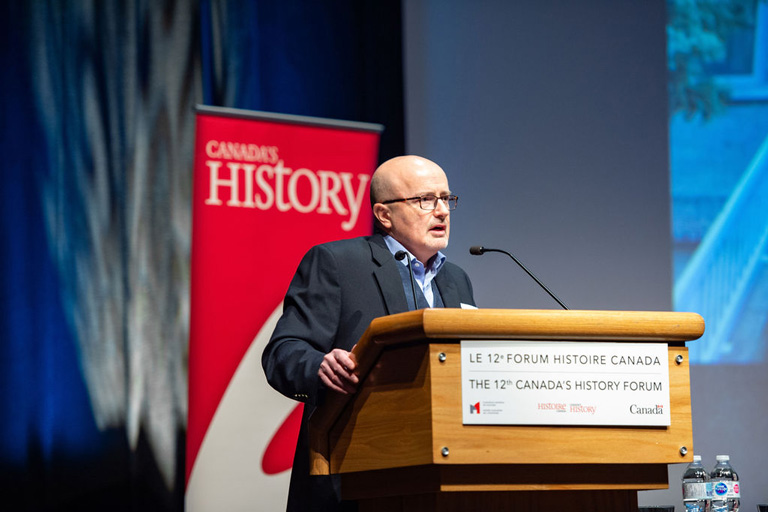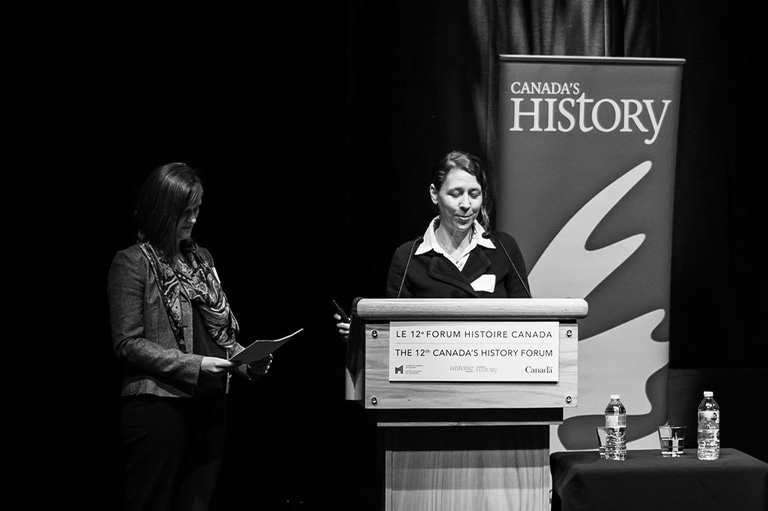2009 Canada's History Forum
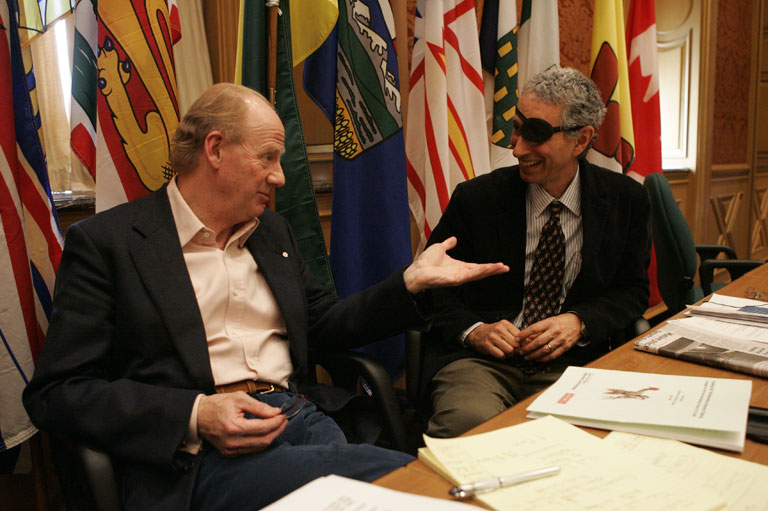
Where did you learn about history? From your history teacher? What about from the local museum, your grandfather, or a story in your local newspaper? Maybe even from The Beaver magazine? Can any of these sources be trusted?
These were the topics debated during Canada’s National History Society’s second annual National History Forum held on February 13, 2009. The forum, sponsored by TD Bank Financial Group, and held on Parliament Hill in conjunction with the Teachers Institute on Canadian Parliamentary Democracy, was a chance for leading history thinkers Dr. John Ralston Saul and Dr. Peter Seixas to discuss the notion of historical trust, the concept of truth in history, and a host of other history-related issues, with more than one hundred educators from across Canada. The debate was wide-ranging, and provoked discussion about the relationships between historical trust, education, and public knowledge.
“We’ve had Dominion Institute surveys measuring what facts people do and don’t know about the past,” noted Dr. Seixas, “but what is our next step in terms of measurement of public historical literacy?”
Dr. Seixas is part of a team of academic researchers studying studying how Canadians learn about their past and how they use it in their day-to-day lives. The “Canadians and Their Past” project looks at what people — young and old — actually understand about the history they have learned. He notes that while many people are often using complex skills to analyze the past, more work still needs to be done. This has important repercussions on how the history curriculum in schools should be changed.
“Up to this point we have not, other than some work with primary sources, articulated them clearly for students so that they can start to unpack the dilemmas of continuity and change, of cause and consequence, of the ethical dimension of history,” Dr. Seixas said. “It’s not just remembering everything that’s in the textbook; they have to master these problems in order to be able to be historically competent.”
John Ralston Saul, one of Canada’s best-known authors, agreed with Dr. Seixas.
“We really have to get away from the idea that we have a couple of facts and this is the basis of our history. This is a real problem,” he says. “In a way, what I’ve been saying is: Most of the key facts presented to explain the direction of Canadian history are facts that were stuck in place late in the nineteenth century and are not facts at all. They’re not facts.”
Dr. Saul has recently completed a new book, A Fair Country, where he challenges the traditional view of Canada’s foundations. He describes the traditional history of Canada as largely the result of political positioning during the late nineteenth and early twentieth century. This version continues to be taken for granted today, he says, event though it’s not based on the actual facts of how things came to be.
Citing the selection of Ottawa as our national capital, Dr. Saul explained how Canadians have largely been disconnected from the original intentions of the Fathers of Confederation.
“For example, we teach almost every kid in this country that Queen Victoria chose Ottawa as the capital, right? It’s not true,” said Dr. Saul. He added that the actual process of choosing the capital was a much more complicated and politically charged affair. There was a series of backroom conversations between the government of the day and the Queen’s representatives, a “phoney” competition held between five cities that was basically rigged to have Ottawa win the bid, and ultimately, multiple votes in the House of Commons before Ottawa was officially named the capital of Canada. In essence, the politicians of the day knew naming Ottawa the capital would ruffle some feathers, so they tried to make it seem like the Queen had made the final decision. “And in spite of this ... prime ministers give speeches, mayors give speeches, (and) history teachers are obliged to teach that the Queen chose Ottawa,” Dr. Saul says. “And by doing that, we represent ourselves as a minor colonial nothing, when in fact it was a very tough decision that had to be made and was made here.”
Dr. Saul said we then are forced to live with the consequences of historical misinformation.
“What is the direct result of that today?” asked Dr. Saul. “The direct result is a continuing discourse across the country that Ottawa is not a proper capital for Canada, that Ottawa is not the natural capital, that Ottawa is a bad place. All of that is born out of the false myth that it was artificially chosen by an aging overweight lady who had never been here. That’s what makes that myth possible. Once you understand that it was actually chosen by Canadians, for Canadians, that changes the myth of the place completely.”
History Society CEO Deborah Morrison noted that while Dr. Saul’s and Dr. Seixas’s presentations likely wouldn’t have been made even a decade ago, and may still be considered contentious by some people, she is encouraged that Canadians are increasingly willing to engage in a deeper examination of their history.
“I agree with you, that there is something happening now that is very exciting,” Dr. Seixas added. “We now have a substantial body of history education research which did not exist in 1990 in North America . . . and it’s as though at this point that the discussion — (one) that was cantankerous and acrimonious in the beginning — has reached a kind of maturity where a lot of the different people in institutions … are now ready to work with each other.”
Dr. Saul agreed that a public willingness to explore our past is snowballing. “It all starts to move and people are suddenly ready for something that was always there.”
Themes associated with this article
Advertisement

